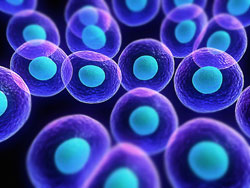
As scientists work to unlock the mysteries of why some 80-year-olds play tennis every week while others must live in nursing homes, researchers with the University of Miami?s Interdisciplinary Stem Cell Institute report they have found the beginnings of what may be the first therapeutic treatment for frailty, a common condition of aging that can lead to falls and other adverse effects. An early stage clinical trial conducted in Miami found that elderly patients breathed easier and walked longer distances after receiving a single infusion of stem cells from young and healthy donors.
Scientists have been making significant headway recently, studying a variety of anti-aging targets from discovering a protein that can restore hair and improve fitness in old mice to revealing how fecal transplants increase the lifespan of some fish. But the arena of stem cell transplantation has offered some of the most exciting anti-aging research outcomes.
Mesenchymal stem cells (MSCs) are a particular type of adult stem cell generating a great deal of interest in the world of science. MSCs are currently being trialed as treatment for no less than a dozen different types of conditions.
The results of two human clinical trials into a stem cell therapy that can reverse symptoms of age-associated frailty have been published, and the indications are that this landmark treatment is both safe and strikingly effective in tackling key factors in aging.
This new MSC treatment is targeted at reducing the effects of frailty on senior citizens. This is the first anti-aging stem cell treatment directed specifically at the problem of age-associated frailty to move close to a final FDA approval stage.
The treatment derives human mesenchymal stem cells from adult donor bone marrow and in these clinical trials involves a single infusion in patients with an average age of 76. Both Phase 1 and Phase 2 human trials have demonstrated the treatment to have no adverse health effects.
Although the two human trials were ostensibly designed to just demonstrate safety they do offer remarkable results in efficacy as well, paving the way for larger, Phase 3 clinical trials.
In the first trial 15 frail patients received a single MSC infusion collected from bone marrow donors aged between 20 and 45 years old. Six months later all patients demonstrated improved fitness outcomes, tumor necrosis factor levels and overall quality of life.
The second trial was a randomized, double blind study with placebo group. Again no adverse affects were reported and physical improvements were noted by the researchers as “remarkable”.
“There are always caveats associated with interpreting efficacy in small numbers of subjects, yet it is remarkable that a single treatment seems to have generated improvement in key features of frailty that are sustained for many months,” writes David G. Le Couter and colleagues in a guest editorial in The Journals of Gerontology praising the research.
The next stage for the research is to move into an expanded Phase 2b clinical trial involving 120 subjects across 10 locations. After that a final, large randomized Phase 3 clinical trial will be the only thing holding the treatment back from final public approval by the FDA.
“With the aging of the population, stem cells hold great promise to treat aging-related disability and frailty, improving physical capacity and quality of life,” says one of the scientists working on the project Joshua M. Hare, Director of the Interdisciplinary Stem Cell Institute at the University of Miami Miller School of Medicine.
“There is no FDA approved treatment for aging frailty and an enormous unmet need that will only increase with the changing demographics.”
The results of the Phase 1 and Phase 2 clinical trials were recently published in The Journals of Gerontology.
References
Phase 1 Trial: Samuel Golpanian Darcy L DiFede Aisha Khan Ivonne Hernandez Schulman Ana Marie Landin Bryon A Tompkins Alan W Heldman Roberto Miki Bradley J Goldstein Muzammil Mushtaq Silvina Levis-Dusseau John J Byrnes Maureen Lowery Makoto Natsumeda Cindy Delgado Russell Saltzman Mayra Vidro-Casiano Marietsy V Pujol Moisaniel Da Fonseca Anthony A Oliva, Jr Geoff Green Courtney Premer Audrey Medina Krystalenia Valasaki Victoria Florea Erica Anderson Jill El-Khorazaty Adam Mendizabal Pascal J Goldschmidt-Clermont Joshua M Hare; Allogeneic Human Mesenchymal Stem Cell Infusions for Aging Frailty; The Journals of Gerontology: Series A, Volume 72, Issue 11, 12 October 2017, Pages 1505?1512, https://doi.org/10.1093/gerona/glx056
Phase 2 Trial: Bryon A Tompkins, MD Darcy L DiFede, RN, BSN Aisha Khan, Msc, MBA Ana Marie Landin, PhD Ivonne Hernandez Schulman, MD Marietsy V Pujol, MBA Alan W Heldman, MD Roberto Miki, MD Pascal J Goldschmidt-Clermont, MD Bradley J Goldstein, MD Muzammil Mushtaq, MD Silvina Levis-Dusseau, MD John J Byrnes, MD Maureen Lowery, MD Makoto Natsumeda, MD Cindy Delgado, MA, CCRC Russell Saltzman, BS.Ed Mayra Vidro-Casiano, MPH Moisaniel Da Fonseca, AA Samuel Golpanian, MD Courtney Premer, PhD Audrey Medina, BSc Krystalenia Valasaki, MSc Victoria Florea, MD Erica Anderson, MA Jill El-Khorazaty, MS Adam Mendizabal, PhD Geoff Green, BA, MBA Anthony A Oliva, PhD Joshua M Hare, MD; Allogeneic Mesenchymal Stem Cells Ameliorate Aging Frailty: A Phase II Randomized, Double-Blind, Placebo-Controlled Clinical Trial; The Journals of Gerontology: Series A, Volume 72, Issue 11, 12 October 2017, Pages 1513?1522, https://doi.org/10.1093/gerona/glx137





